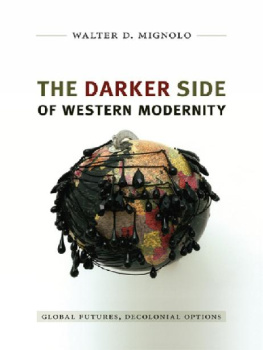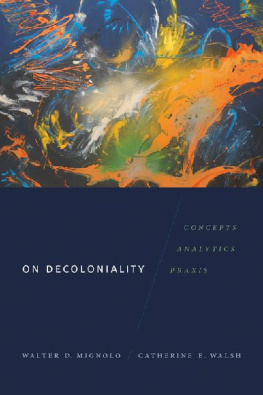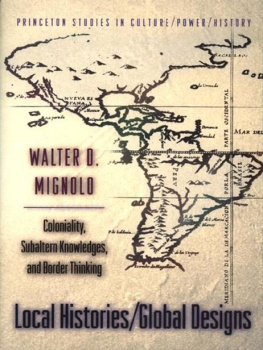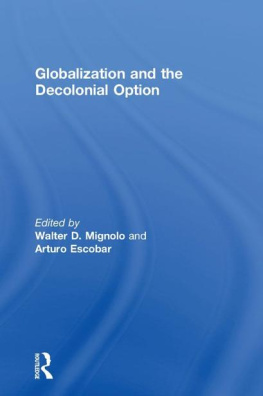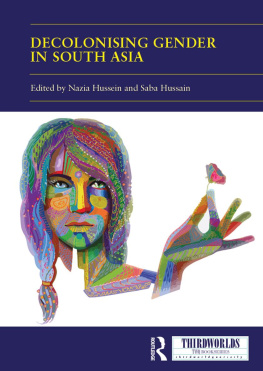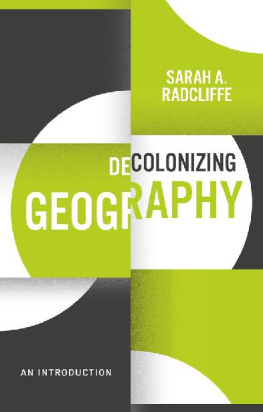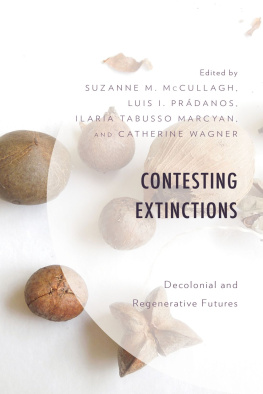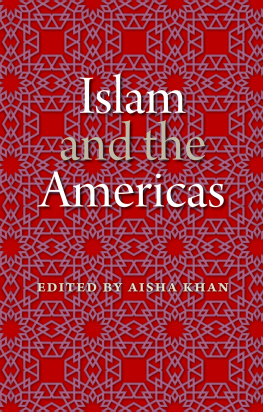The Darker Side of Western Modernity
A book in the series
LATIN AMERICA OTHERWISE Languages, Empires, Nations
Series editors
WALTER D. MIGNOLO, Duke University
IRENE SILVERBLATT, Duke University
SONIA SALDVAR-HULL, University of Texas, San Antonio
THE DARKER SIDE OF WESTERN MODERNITY
Global Futures, Decolonial Options
Walter D. Mignolo
DUKE UNIVERSITY PRESS Durham & London 2011
2011 Duke University Press All rights reserved
Printed in the United States of America on acid-free paper
Designed by Jennifer Hill. Typeset in Minion Pro by Achorn International
Library of Congress Cataloging-in-Publication Data appear on the last printed page of this book.
Contents
Once again, to Andrea and Alexander. Life continues, and so the conversations.
And to Reynolds Smith, for twenty years of conversation and the more than a decade of working on Latin America Otherwise.
ABOUT THE SERIES
Latin America Otherwise: Languages, Empires, Nations is a critical series. It aims to explore the emergence and consequences of concepts used to define Latin America while at the same time exploring the broad interplay of political, economic, and cultural practices that have shaped Latin American worlds. Latin America, at the crossroads of competing imperial designs and local responses, has been construed as a geo-cultural and geopolitical entity since the nineteenth century. This series provides a starting point to redefine Latin America as a configuration of political, linguistic, cultural, and economic intersections that demands a continuous reappraisal of the role of the Americas in history, and of the ongoing process of globalization and the relocation of people and cultures that have characterized Latin Americas' s experience. Latin America Otherwise: Languages, Empires, Nations is a forum that confronts established geo-cultural constructions, rethinks area studies and disciplinary boundaries, assesses convictions of the academy and of public policy, and correspondingly demands that the practices through which we produce knowledge and understanding about and from Latin America be subject to rigorous and critical scrutiny.
In this pathbreaking work, Walter D. Mignolo further pierces the surface episteme of rationality marking Western modernity to reveal its terrible and hidden underside. Western modernity, he shows convincingly, is inseparable from the logic of coloniality: modernitys' s elaborate faade of civilizing and civilization covers its necessary foundation in the terror-logic of imperial rule. Not only a critique of dominant Western paradigms of knowledge, but of so-called critical studies, Mignolos' s volume exposes the pervasiveness of Western epistemic rationalities along with their self-congratulatory sentiments. But The Darker Side of Western Modernity goes beyond revealing the limitations of Western epistemic rationality and its geopolitical genesis. Mignolos' s extraordinary contribution is to present and strategize a decolonial epistemology or ways of being in the worlda route to agency through decolonial thinking and decolonial transformative being. This is thinking otherwise.
PREFACE AND ACKNOWLEDGMENTS
What actual significance do you think there is in discussing the question of modernity? Discussing the significance of the question of modernity involves many dimensions. These include, for instance, the relation between contemporary nationalism and modernity, the question of globalization, consumerism, the theory of modernization, and West-centrism. If we are talking about the direct significance of this question, however, then I think that the critique of developmentalism is a very important aspect. The reconsideration of developmentalism is a very important aspect. The reconsideration of developmentalism is specially urgent today. I am not an expert on this matter but I am still willing to go over a cursory discussion of these perspectives.
WANG HUI and KE KAIJUN, An Interview Concerning Modernity, 2009
The structure of the argument and therefore of the book is built on the premises that currently there are three types of critique to modernity. One type is internal to the history of Europe itself and in that sense these premises are a Eurocentered critique of modernity (for example, psychoanalysis, Marxism, poststructuralism, postmodernity), and the other two types emerged from non-European histories entangled with Western modernity. One of them focuses on the idea of Western civilization (for example, dewesternization, Occidentosis), and the other on coloniality (such as postcoloniality, decoloniality). The three types of critiques are analyzed in relation to their point of origination and their routes of dispersion. Postmodernity originated in Europe but dispersed around the world. Decoloniality originated among Third World countries after the Bandung Conference in 1955, and also dispersed all over the world. Dewesternization originated in East Asia, but the dewesternizing argument can be found in other parts of the world.
The unfolding of the books' s argument is not linear but spiral, a mode of exposition that I have already practiced in two previous books ( The Darker Side of the Renaissance and Local Histories / Global Designs ), both of which form a trilogy with this one. As in jazz, I have a leitmotif and several formulaic sentences that the reader will encounter once and again in the preface and introduction, and which will reappear in each chapter and the afterword. Leitmotif and formulaic sentences are not facts or principles that once announced need not reappear. They have to reemerge, not only to illuminate the topic of a given chapter but also to be empowered by the issues, topics, and problems examined in each chapter.
The initial idea of the book, which dates back to around 2002, was to show that the belief in one sustainable system of knowledge, cast first in theological terms and later on in secular philosophy and sciences (human and natural sciences; nomothetic and ideographic sciences, as WilhemDilthey distinguished the science of the spirit from the hard sciences), is pernicious to the well-being of the human species and to the life of the planet. Such a system of knowledge, referred to here as the Western code, serves not all humanity, but only a small portion of it that benefits from the belief that in terms of epistemology there is only one game in town. The code has been preserved in the security box since the Renaissance. Diverse knowledge has been generated from that secret code in six European modern or imperial languages: Italian, Spanish, Portuguese, French, German, and English. One may discern a hierarchy within modern European languages when it comes to epistemology. Certainly, theology was grounded in Latin and translated to vernaculars, while romance languages enjoyed a certain respectability in terms of knowledge making. However, after the Enlightenment, French was the romance language that led the second modernity, while German, and more recently English, have come to be the language that preserves and hides the code.
One last observation: in the epigraph above, Wang Hui connects modernity with development. One will not find such a connection among the thousands of pages written and published in Europe and the U.S. about modernity. In the same vein the question about modernity and the geopolitics of knowledge is not being asked. In sum, when I say that decoloniality and postcoloniality did not originate in Europe but in the Third World, I am reminded that Aim Csaire and Frantz Fanon, for instance, were in France where they wrote their influential books. Fanon actually was in Algeria when he wrote The Wretched of the Earth (1961). The point, however, is not where you reside but where you dwell. Csaire and Fanon, both Martinican, dwelled in the history of the Middle Passage, of the plantations, of slavery and of the runaway slaves. Furthermore, the spirit of the Bandung Conference showed that there is a horizon to explore beyond capitalism and communism: decolonization. Decolonization is the horizon of thinking and being that originated as response to the capitalist and communist imperial designs.

